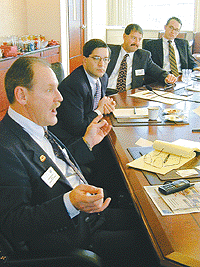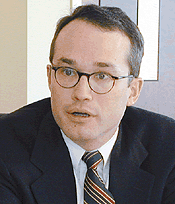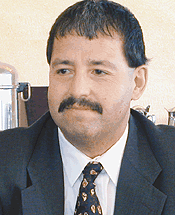Freight Rate Hikes Will Pay for Driver Raises, Panelists Tell TT Forum
 |
The experts, drawn from the worlds of carrier operations, shippers, drivers, government regulation and business economics, broke bread with a pack of trucking reporters Jan. 7, and outlined what they expect in the coming year from the economy, the government, suppliers and the high-tech revolution.
 Michael James - Transport Topics |  |
| OOIDA Executive Vice President Todd Spencer, left, makes a point while Roger Nober, Theodore R. Scherck and Donald Broughton listen. |  |
Nober also told the group that although parts of trucking would like to see relaxation of the freeze on longer combination vehicles and increases in size and weight limits, it is unlikely that will happen anytime soon.
Some of the things said during the forum were not likely to strike well-informed members of the industry as new information.
It came as no surprise, for example, that none of the panelists who spoke on the subject of high-tech safety devices for commercial motor vehicles favored the mandatory use of black boxes, either to monitor hours-of-service compliance or to reconstruct accidents.
“Black boxes won’t make a nickel’s worth of difference in highway safety but will add thousands of dollars in new costs to trucks and truckers,” Todd Spencer, executive director of the Owner-Operators Independent Drivers Association, said.
 |  Michael James - Transport Topics |
 | A.G. Edwards & Sons senior analyst Donald Broughton |
Broughton also predicted that the refrigerated sector would be consolidated this year, though he did not speculate on how that might occur.
John M. Smith, president of truckload carrier CRST International, stressed the acute need for higher rates from shippers for the services that carriers provide.
“Improved pricing is a key for this industry in 2000,” Smith said. “Without it, the industry will inevitably see a downturn in service, capacity and effectiveness. With improved rates, we can drive the economy.”
Against the backdrop of a still-strong economy, Theodore R. Scherck, president of the Colography Group, outlined basic shifts in trucking’s various subsectors.
Almost two-thirds of all goods shipped by for-hire trucks in the United States now travel less than 700 miles to market, according to Scherck, a research specialist who expounded the shippers’ viewpoint.
“In fact, short-haul service accounted for 63% of the $56 billion spent on U.S. domestic expedited services last year,” he said.
Short-haul trucking is growing twice as fast as its long-haul cousin, he added, noting that his research has found that since 1994, short-haul trucking services have enjoyed a 9.7% compound average growth rate, compared with 4% for long-haul services.
 |  Michael James - Transport Topics |
 | Colography Group President Theodore R. Scherck |
“Conventional wisdom says that warehouses and inventory are twin pariahs. Conventional wisdom is that the logistics manager isn’t performing unless he is collapsing warehouses and pulling inventory out of his company’s system. And the conventional wisdom touts globally based point-and-click distribution as the panacea for every logistics problem faced by every business in every situation,” Scherck said.
“Unfortunately, this is simply not true. Life would be much simpler if it were.”
Scherck suggested that a just-in-time supply chain model, while compelling in theory, turns out not to work equally well in all markets or for all commodities. When shippers tried just-in-time for some goods, they found they ran out of those goods on the retail floors. Thus, the renaissance of warehousing for some markets and goods.
Electronic retailing and demand for high-value, low-density commodities will help mainly parcel delivery carriers and to a lesser extent long-haul carriers; the same trend will devastate the mid-range less-than-truckload market, Scherck said.
Overall, the forum’s tone was modestly upbeat, although the one participant representing the driver’s perspective said he’d like to see fewer words and more action on some of the issues his constituency cares about, such as driver compensation and dock delays.
“I know some carrier execs will say that money is not the only issue, and they are right — but money will offset many aggravations just the same,” said Spencer.
The OOIDA executive called the 30 to 43 hours drivers have to wait at loading docks “almost unimaginable” and suggested that it could “bring the trucking industry to a crawl” when new hours-of-service regulations come out.
 |
Spencer also rejected Smith’s call for younger drivers, saying that putting 18-year-olds behind the wheel in tractor-trailers could pose a threat to safety.
Daniel P. Bearth contributed to this report.

